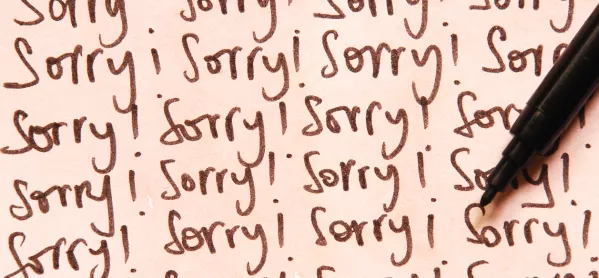“I’m sorry, I’m no expert on this but could we possibly…”
Have you ever heard yourself say something like this to your team?
I certainly have and I cringe to think how I must have come across.
Quick read: How to negotiate a higher salary as a teacher
Quick listen: Professor Angela Duckworth on character education
Want to know more? How to create a winning team the dynamic way
Such phrases can make women appear weak or ineffective to colleagues, which in turn may affect whether they are promoted or tapped on the shoulder for forthcoming opportunities. These phrases are also in stark contrast to the way some men big themselves up.
And such linguistic differences have a tangible impact: researchers have found that subjective views of men and women vary enormously, with women far more likely to be described as indecisive, inept and panicky.
The thing is, we are experts in our fields and it’s sad that we sometimes feel the need to make ourselves smaller in the eyes of other people. When I host workshops on this topic, I see women physically reducing in size as they share the phrases in their own apologetic language.
It’s such a common phenomenon that it was affectionately parodied by Amy Schumer - have a look and think about whether you say or do any of this.
Just desserts
In addition to “sorry”, another bête noire of mine is “just”. These words pepper the language of so many women that they often don’t realise they are saying them and certainly not how often.
I once noted how often an excellent colleague said “sorry” in an hour-long planning meeting. It was 32 times. The discussion we had after that highlighted how little awareness she had of the symptoms of imposter syndrome.
Ask a trusted colleague to do this with you one day; the conversation may help a great deal.
We do the same thing when we’re communicating in other ways, such as emailing and on social media. For example, @danidonovan’s Instagram posts about how to “email like a boss” (and how not to) went viral. She said she had a “bad habit” of using apologetic language “to sound extra-friendly and non-threatening”.
Author Sloane Crosley offers another analysis of why women use apologetic language more than men: to her, these phrases “sound like tiny acts of revolt, expressions of frustration or anger”.
She suggests we use qualifiers such as “sorry”, “just”, and “only”, because “we think the apology will serve as a prompt for the person who should be apologising”.
This really resonated with me and has helped me to stop qualifying what I want to say and to be more clear and direct with colleagues. And they, in turn, seem to appreciate the clarity. If our apologetic language is obfuscating what we are trying to say, no wonder we can come across as ineffective.
Time to change
So it’s time to be clear and assertive in the way we communicate at work. Here are some more examples of what we can say (instead of apologising for speaking):
- Change “I would like to…” to “I want to…”
- Change “If you get a moment, would you be able to…” to “Can you…”
- Change “I know you’re really busy, but…” to “This is urgent.”
- Change “Yes, OK, don’t worry about it” to “No, this is my point of view.”
Practising this change and working at it can help you enormously, especially in those tough conversations about pay or working hours and conditions.
Let’s stop unconsciously sabotaging ourselves and communicate courageously and authentically.
Vivienne Porritt is an education consultant, vice-president of the Chartered College of Teaching, a co-founder and strategic leader of #WomenEd and the co-editor of 10% Braver: inspiring women to lead education. She tweets @ViviennePorritt


